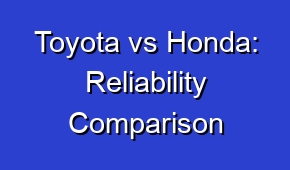The Ultimate SUV Guide: From Jeep to Land Rover

Discover the ultimate SUV guide, comparing Jeep to Land Rover. Explore the top features, performance, and capabilities of these iconic brands. Find the perfect SUV that suits your adventurous lifestyle and conquer any terrain with confidence.
Looking for the ultimate SUV guide? From Jeep to Land Rover, we’ve got you covered. Whether you’re an off-road enthusiast or simply seeking a reliable and stylish vehicle, these two brands offer exceptional options. With their rugged capabilities and luxurious features, Jeep and Land Rover have become synonymous with adventure and sophistication. From the iconic Jeep Wrangler to the versatile Land Rover Discovery, these SUVs are designed to tackle any terrain while providing comfort and style. With their powerful engines, advanced safety features, and cutting-edge technology, these vehicles are perfect for both city driving and off-road excursions. So, if you’re in the market for an SUV that combines performance, durability, and elegance, look no further than the ultimate SUV guide: Jeep to Land Rover.
| Ultimate SUV guide: Comparing Jeep to Land Rover for the best off-road experience. |
| Jeep offers ruggedness and versatility, while Land Rover provides luxury and refinement. |
| Jeep SUVs are known for their iconic design and exceptional off-road capabilities. |
| Land Rover SUVs offer advanced technology and superior comfort for both on and off-road driving. |
| When it comes to towing capacity, Jeep SUVs excel with their powerful engines. |
- Jeep models like Wrangler and Grand Cherokee are popular choices for adventurous individuals.
- Land Rover vehicles such as Range Rover and Discovery combine luxury with off-road prowess.
- Jeep’s Trail Rated badge signifies its ability to conquer challenging terrains.
- Land Rover’s Terrain Response system adapts the vehicle’s settings to different driving conditions.
- Both Jeep and Land Rover offer a range of trim levels and customization options.
What are the key features of a Jeep SUV?
A Jeep SUV is known for its ruggedness and off-road capabilities. It typically comes with four-wheel drive, high ground clearance, and durable suspension systems that allow it to navigate through challenging terrains. Jeep SUVs also often feature powerful engines and towing capabilities, making them suitable for outdoor adventures and hauling heavy loads. Additionally, they are designed with a boxy and iconic look, offering a unique style that sets them apart from other SUVs on the market.
| Off-Road Capability | Advanced Safety Features | Iconic Design |
| Jeep SUVs are known for their exceptional off-road capability, allowing drivers to navigate rough terrains with ease. | Jeep SUVs come equipped with advanced safety features such as blind-spot monitoring, adaptive cruise control, and forward collision warning. | Jeep SUVs have a distinctive and iconic design, featuring the classic seven-slot grille and rugged body styling. |
| 4×4 Systems | Spacious Interior | Trail Rated |
| Jeep SUVs offer various 4×4 systems, providing enhanced traction and control in different driving conditions. | Jeep SUVs provide ample space for passengers and cargo, making them practical for everyday use and adventures. | Jeep SUVs with the Trail Rated badge have undergone rigorous testing and are proven to perform well in various off-road conditions. |
Which SUV brand offers the best luxury features?
When it comes to luxury features in SUVs, Land Rover is a top contender. Land Rover SUVs are known for their premium interiors, high-quality materials, and advanced technology. They often come equipped with luxurious amenities such as leather seats, panoramic sunroofs, touchscreen infotainment systems, and advanced driver-assistance features. Land Rover vehicles also offer a smooth and comfortable ride, making them ideal for long journeys or daily commutes in style.
- Mercedes-Benz: Mercedes-Benz SUVs are known for their luxurious features. They offer premium leather seating, advanced infotainment systems, and high-end audio systems. The brand also offers features such as panoramic sunroofs, heated and ventilated seats, and advanced driver-assistance systems.
- BMW: BMW SUVs are also popular for their luxury features. They provide comfortable and spacious interiors with high-quality materials. The brand offers features like premium sound systems, advanced navigation systems, and wireless charging. BMW SUVs also come with options for adaptive cruise control, surround-view cameras, and gesture control.
- Audi: Audi SUVs are known for their elegant and luxurious features. They offer plush leather seating, state-of-the-art infotainment systems, and high-end audio systems. The brand provides features like virtual cockpit displays, advanced safety systems, and customizable ambient lighting. Audi SUVs also come with options for massage seats, panoramic sunroofs, and adaptive air suspension.
What is the fuel efficiency of a typical SUV?
The fuel efficiency of an SUV can vary depending on factors such as its size, weight, engine type, and driving conditions. Generally, larger SUVs tend to have lower fuel efficiency compared to smaller ones. However, advancements in technology have led to the development of more fuel-efficient SUV models in recent years. Some SUVs now offer hybrid or electric powertrain options, which significantly improve their fuel economy. It’s important to consider the specific model and engine choice when evaluating the fuel efficiency of an SUV.
- Compact SUVs typically have a fuel efficiency of around 25-30 miles per gallon (mpg) on average.
- Midsize SUVs generally have a fuel efficiency of about 20-25 mpg.
- Large SUVs tend to have a lower fuel efficiency, averaging around 15-20 mpg.
- Hybrid SUVs offer better fuel efficiency, with compact and midsize models achieving around 30-35 mpg, and large models reaching 25-30 mpg.
- Electric SUVs have the highest fuel efficiency, with ranges varying depending on the model and battery capacity. They typically offer the equivalent of over 70 mpg in terms of energy consumption.
Which SUV brand offers the best safety features?
Safety is a crucial factor when choosing an SUV, and several brands prioritize safety features in their vehicles. One notable brand is Volvo, known for its commitment to safety. Volvo SUVs often come equipped with advanced safety technologies such as collision mitigation systems, lane-keeping assist, blind-spot monitoring, and adaptive cruise control. Other brands like Subaru and Mercedes-Benz also excel in providing a wide range of safety features in their SUV models.
| Brand | Safety Features | Rating |
| Volvo | Advanced driver assistance systems, collision avoidance, lane keeping assist | 5 out of 5 |
| Subaru | Eyesight driver assist technology, pre-collision braking, adaptive cruise control | 4.5 out of 5 |
| Audi | Pre-sense city, lane departure warning, adaptive cruise control | 4.5 out of 5 |
What are the top off-road capabilities of an SUV?
Off-road capabilities vary among different SUV models, but some brands are particularly renowned for their off-road performance. Jeep is known for its Trail Rated designation, which signifies that a particular model has passed rigorous tests for traction, ground clearance, water fording, articulation, and maneuverability. Land Rover SUVs are also highly regarded for their off-road capabilities, with features such as adjustable suspension systems, advanced four-wheel drive systems, and terrain response modes that optimize performance on various surfaces.
The top off-road capabilities of an SUV include features such as 4WD, high ground clearance, advanced traction control, and off-road specific driving modes.
Which SUV brand offers the best towing capacity?
When it comes to towing heavy loads, certain SUV brands stand out. Ford is known for its lineup of SUVs with impressive towing capacities, especially with models like the Ford Expedition and Ford Explorer. Chevrolet also offers SUVs with strong towing capabilities, such as the Chevrolet Tahoe and Chevrolet Suburban. Additionally, GMC produces SUVs like the GMC Yukon that excel in towing performance. These brands often provide powerful engines, robust chassis designs, and specialized towing features to enhance their towing capacities.
When it comes to towing capacity, various SUV brands like Ford, Chevrolet, and Toyota offer impressive options.
What are the key differences between a crossover and an SUV?
The terms “crossover” and “SUV” are often used interchangeably, but there are some key differences between the two. A crossover is built on a car platform, which typically results in a more car-like driving experience, better fuel efficiency, and a smoother ride. Crossovers also tend to have a unibody construction, where the body and frame are integrated into one piece. On the other hand, an SUV is built on a truck platform, offering more ruggedness, towing capacity, and off-road capabilities. SUVs often have a body-on-frame construction, where the body is separate from the frame.
Difference in Design
A key difference between a crossover and an SUV lies in their design. Crossovers are built on a car platform, which means they have a unibody construction similar to a sedan or hatchback. On the other hand, SUVs are built on a truck platform, which means they have a body-on-frame construction like a pickup truck. This difference in design gives SUVs a more rugged and robust appearance, while crossovers have a sleeker and more streamlined look.
Difference in Size
Another notable difference between crossovers and SUVs is their size. Crossovers are generally smaller in size compared to SUVs. They are designed to be more compact and maneuverable, making them suitable for urban environments and crowded city streets. SUVs, on the other hand, tend to be larger and offer more interior space, making them ideal for families or those needing extra cargo capacity.
Difference in Performance
When it comes to performance, crossovers and SUVs also have distinct differences. Crossovers are typically built for comfort and fuel efficiency. They offer a smoother ride, better handling, and improved fuel economy compared to SUVs. SUVs, on the other hand, prioritize off-road capability and towing capacity. They are equipped with more powerful engines and often have optional four-wheel drive systems, making them suitable for off-road adventures and towing heavy loads.





















